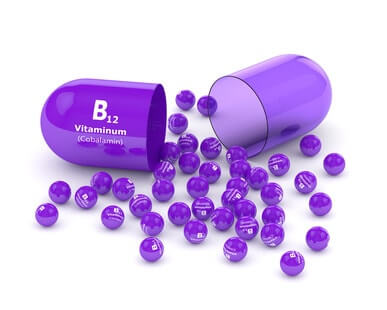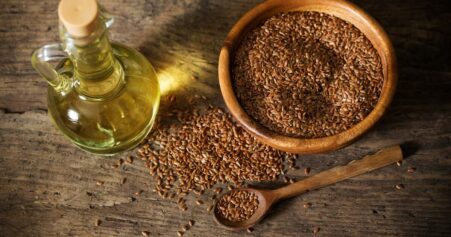Table of Contents
Vitamin B12 – a water-soluble vitamin that is the talk of the town, especially among vegans and in relation to deficiencies. Understandable, especially since an undersupply can lead to devastating, irreversible damage to the nervous system and blood formation. The importance of its presence or non-presence in a purely plant-based diet should definitely be emphasized; however, there is hardly any talk about overdosing vitamin B12 and possible side effects. An oversupply with cobalamin is also possible, for which there are pathological causes, for example. But it is not only due to diseases that the essential vitamin can potentially be our undoing. A vitamin B12 overdose through supplements and parenteral administration in particular can cause undesirable or even dangerous vitamin B12 side effects. What are these, and how can the problem arise in the first place? We took a closer look at this topic.
Hypercobalaminemia: Definition

Hypercobalaminemia is the term used to describe an overdose of vitamin B12 (cobalamin). This pathological condition is defined as a blood level of > 950 pg/ml or > 701 pmol/l (Andrès et al., 2013). Incidentally, the healthy reference range is 191-663 pg/ml and correlates closely with oral cobalamin intake, which is why the vitamin B12 blood level alone is not an adequate parameter to diagnose a deficiency (Herrmann and Obeid, 2014).
An overdose of vitamin B12 through diet is hardly possible and also not known, since the required transport protein IF (intrinsic factor) and absorption via the intestinal mucosa are two major barriers. That means, even if the diet is rich in cobalamin, the body does not absorb excess amounts into the bloodstream. In addition, the bioavailability of the vitamin B12 ingested depends on the amount delivered in each dose (Domke et al., 2004). The European Food Safety Authority (EFSA) sets the adequate intake (AI) for adolescents and adults at 4 µg vitamin B12 per day.
Vitamin B12 is found in food of animal origin, in milk (products), eggs as well as meat and especially in offal. The classic vitamin B12 sources for vegans are dietary supplements, usually in the form of methyl- or cyanocobalamin as well as in oral dosage forms, such as (lozenge) tablets or drops. Another option for vitamin B12 supply, which is given in particular in the case of a clinically manifest deficiency, is the parenteral form or vitamin B12 injections. In this case, the cobalamin enters the bloodstream directly and bypasses enteral absorption with the help of the intrinsic factor. Especially with this source, adverse symptoms may occur due to an vitamin B12 overdose.
Symptoms
The clinical symptoms of hypercobalaminemia have not yet been fully investigated. However, it has been shown that high blood levels of vitamin B12 can cause the diagnostic features of cobalamin deficiency, which is due to binding to the different transport proteins. Increased attachment was observed to the “inactive” forms TC I and III, two transport proteins that only ensure the binding of free vitamin B12. TC II, on the other hand, is responsible for uptake into the body’s cells, especially into hepatic tissue. Excess cobalamin in the blood showed barely detectable binding to TC II (Andrès et al., 2013). An autoimmune-induced formation of antibodies, i.e. defense substances, against this relevant binding protein TC II is considered to be a possible cause (Takahashi et al., 2013).
If the vitamin is administered by injection in response to a deficiency and enters the bloodstream directly in high concentrations, an immunologic reaction with skin reactions is possible.
Causes
In most cases, pathologically elevated cobalamin levels underlie certain diseases or organ dysfunctions, especially those affecting liver tissue. These include, for example, hepatitis, tumors or metastases in the liver; however, cases of hypercobalaminemia in leukemia, autoimmune diseases, and pulmonary and renal dysfunction have also been observed (Andrès et al., 2013; Arendt et al., 2013).
In addition to limited absorption via the IF, the intake of high-dose supplements leads to passive diffusion, i.e., the vitamin can freely enter the bloodstream without IF binding and receptor uptake. However, this absorption method occurs only to a limited extent. In addition to excessive intake of dietary supplements, parenteral administration of vitamin B12 may be another cause of excess, which is likely associated with an immune system response to produce anti-TC II antibodies.
Is There Any Risk to Health?

Based on the data available in 2015, EFSA did not identify any known health risks associated with the use of dietary supplements, so no maximum dose or maximum daily intake, also known as a tolerable upper intake, was set (EFSA, 2015). However, the BfR recommends limiting the daily intake to a maximum of 9 µg, i.e. three times the recommended daily amount. Preventive health reasons are given for this recommendation (Domke et al., 2004).
A study indicates that regular overdose of isolated vitamin B12 supplements, especially among male smokers, may increase the risk of lung cancer (Brasky et al., 2017). With the exception of this, a tumorigenic effect has only been shown in the past in an animal experiment with rats (EFSA, 2006).
When vitamin B12 is taken in bypassing the gastrointestinal tract, immunologically induced skin reactions such as eczema, acne or urticaria have been observed on the one hand. However, due to their reversibility, these side effects do not pose any lasting danger. On the other hand, severe reactions such as anaphylactic shock can occur, albeit only in rare cases; this is a maximum hypersensitivity reaction of the immune system with varying degrees of severity, but which can be acutely life-threatening (Bilwani et al., 2005).
The cyanide (prussic acid) in cyanocobalamin in supplements is generally not dangerous for the consumer. Even in high-dose supplements, the maximum acceptable level of prussic acid set by EFSA is not reached.
Risk Groups and Risk Factors
Individuals with the diseases already described, primarily involving tumors of the liver, may develop hypercobalaminemia. In addition, people who take a vitamin B12 overdose, especially in parenteral form, may be affected by reversible skin reactions.
Smoking is a potential risk factor for regular use of high-dose vitamin B12 supplements as hepatic tumorigenesis may be promoted. In addition, the concentration of cyanocobalamin is detectable in plasma only in smokers due to the increased cyanide exposure of cigarette smoke in combination with the dietary supplement (Domke et al., 2004).
Hypercobalaminemia in Our Society
An overdose of vitamin B12 is not a relevant problem. According to the National Nutrition Survey (2008), the average cobalamin intake of the German population, which primarily follows a mixed diet, is just above the recommendations of 4 µg/day.
Deficiencies can be observed more frequently, with older persons as well as vegetarians and especially vegans representing risk groups (Shipton and Thachil, 2015).
Vitamin B12 Overdose in a Vegan Diet
Long-term implementation of the vegan diet without taking vitamin B12 supplements is strongly correlated with a deficiency. If switching to a plant-based diet, it usually takes years before a clinically manifest deficiency develops, especially taking the reserve capacity of the body into consideration. An insufficient vitamin B12 supply in children and adolescents more easily leads to pathological consequences (Stahl and Heseker, 2007). Thus, from a scientific point of view, dietary supplements are urgently recommended for this group of people.
To avoid a potential risk of hypercobalaminemia or possible health risks of high-dose dietary supplements, an annual blood test is recommended, after which targeted substitution can be performed.

Summary: Potential Risk Factors of Vitamin B12 Overdose
A vitamin B12 overdose, resulting in blood levels above the reference range, is called hypercobalaminemia. Certain organ diseases and especially tumors are associated with the occurrence of this pathological manifestation.
For physiological reasons, dietary vitamin B12 generally cannot cause hypercobalaminemia. Regular intake of high-dose supplements may have carcinogenic potential, especially among smokers. High-dose vitamin B12 injections can cause immunologically induced skin reactions, which is why an amount adjusted to the individual blood level is recommended for supplementation among vegans to avoid possible vitamin B12 side effects.
The content of this article cannot and should not replace an individual vegan nutrition consultation. In the International Directory for Vegan Nutritionist you can find experts on vegan nutrition in your area or online.









Leave a Reply